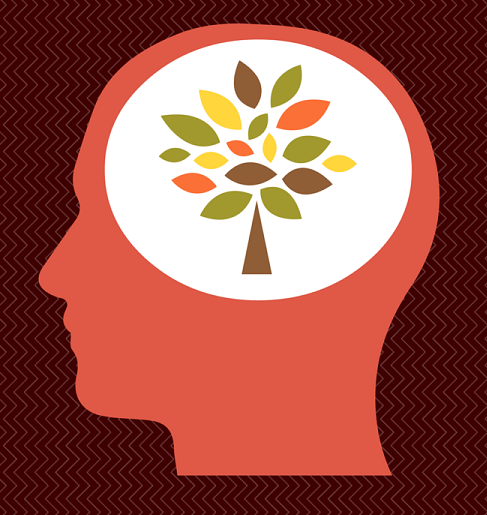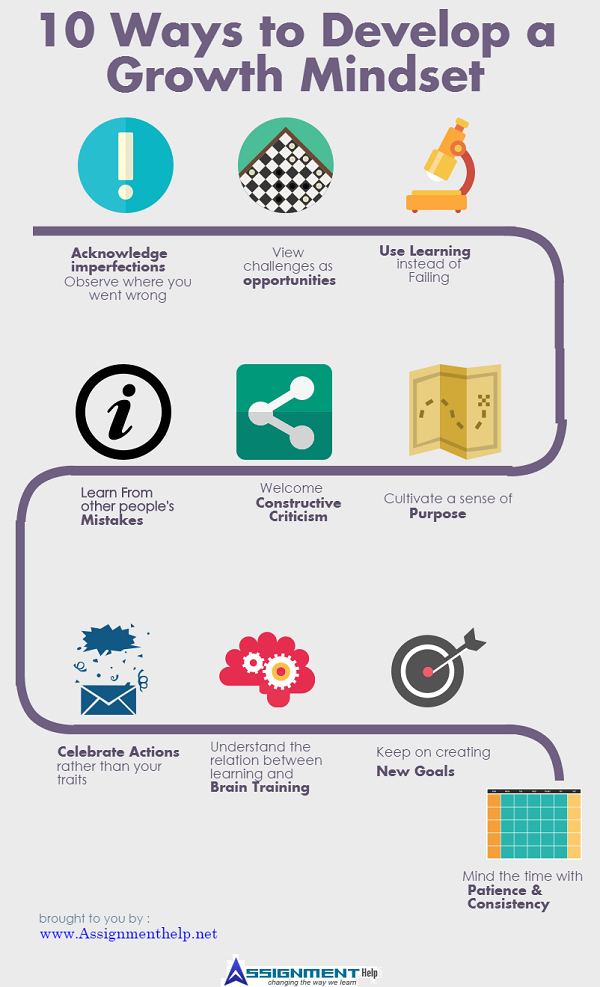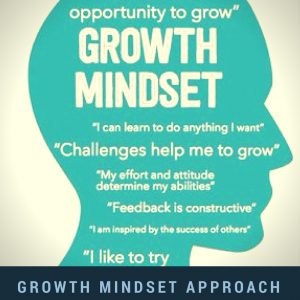10 Things You Need to Know to Develop a Growth Mindset
“There are two primary choices in life; to accept conditions as they exist, or accept the responsibility for changing them.”-Denis Waitley
Mind. One thing which keeps working all the time. The one that never stops. The guiding force that motivates you, guides you, makes you or break you. Our mind is the thing which controls most of the functions of the body, be it physical, mental, emotional or spiritual. But how does it work? Is there a process for it or it just keeps boggling us on its own?
According to Stanford psychologist Carol Dweck, there is a mindset which sets the path of working of our mind. There are two types of mindsets:-
- Growth mindset
- Fixed mindset
The concepts developed by Carol Dweck on these mindsets are opposite to each other, demonstrating a sharp contrast in the way people with such mindsets think.

People with fixed mindset consider the past experiences as proof of their inherited traits. They do not work ahead on it, such as how to avoid a problem in future from repeating again or how to improve on mistakes. For them, a poor grade in the subjects mean that they are not smart and they do not have the capabilities to score well.
Also, if they achieve something, they consider it to be a trait with which they are born with. This may reflect when they interpret that getting the lead actor role in the play for the cultural day means that they are a born actor and the acting skills are gifted to them.
On the other hand, a person with growth mindset thinks completely differently than the ones with fixed mindsets. They keep ‘growing’. Such people see their past performance as an indicative of past effort and their training. For getting a poor grade in the subjects will make them wonder about themselves inside and try to figure out where they went wrong. As a solution, they may think to meet the teacher and develop a better approach towards the subject and try harder next time.
On achieving a target, people with growth mindsets see it as a result of their hard work and consistency. For such a person, bagging the lead role in the drama will be an output of hard work and contributions he gave to the drama club since months, which he has been doing for each of the show. Optimism reflects in their thought process, unlike the fixed mindset.
As Dweck says, “this growth mindset is based on the belief that your basic qualities are things you can cultivate through your efforts. Although people may differ in every way in their talents, aptitudes, interests or temperaments, everyone can change and grow through application and experience.”
Clearly, the ones with growth mindset have a better approach towards things than the fixed mindsets. It is always required to improve in life and rise above than your existing performance. But if you feel that you are a fixed mindset, then what do you do? Don’t worry; it is possible to develop growth mindset too. Both are things related to our minds, and can be developed or altered as per our choice.

To do so, here are the suggestions one should follow to develop a growth mindset. It will help you to look at situations and problems from a new perspective.
- Acknowledge your imperfections
Overlooking your weaknesses means that you will never overcome them, and they will remain problems. Change your way of thinking that mistakes mean failure. Observe them and try to figure out where you went wrong. It is the first step to improve.
- View challenges as opportunities
Its Friday night, you are about to finish up the summary of the project given to you and about to leave, when suddenly your boss barges into your cabin and loads you with a couple more projects to be reviewed by tomorrow noon. You’re in a fix now. What to do? Make excuses because you think it is impossible, or try working till late and submit it before the given deadline?
That is where you take the next step to develop growth mindset-view obstacles or challenges as opportunities. Try to see it from a positive view.
Try to figure out the outcome if you complete the work-you will learn time management and you will be in the good books of your boss. Bingo! What else do you need?
- Use ‘learning’ instead of ‘failing’
No one is perfect. The greatest scientists we know and have read about are a good example of it. They kept on trying despite failing several times, till they achieved what they wanted. What was their secret?
Simple. They never looked at their failures as failures. They interpreted it as learning and areas to improve. This surely helps you to learn through your experiences and improve your performance.
- Learn from other people’s mistakes
Yes! You cannot commit all sorts of mistakes in your life so as to learn from them. You have to look around for examples of other people and learn from them. Everyone around is trying to improve, rise above their current situations and master their skills. But they do fail at times.
Learn from their incidents. Try to look at points regarding others’ cases with questions like, why did he do so, what did he do after failing, what will I do if same happens to me, is there any other key to the solution and so on. There can be many more ideas about a situation you see around you. Be vigilant and notice them.
- Welcome criticism which come towards you
Sometimes it happens that we are not able to sort out our problems or the mistake where we went wrong, but others take note of that. They point out at them, which is referred to as criticism. It does seem rude and hurting, but it is important.
It tells that how others react to your performance. It also helps you to look at your own work from a new perspective and see problems in it. Accept it positively and work on it then.
This is an important step to develop a growth mindset. A person with fixed mindset will just think that either he cannot do it or the person criticizing him does not like him.
- Cultivate a sense of purpose
Students with a growth mindset were found to be with a greater sense of purpose. They had their questions for each situations, such as why they are doing this, how will they do it, when will they do it and so on. When you get the answers to such queries, you will learn to focus better on your problem.
- Celebrate your actions rather than your traits
Applaud for your actions which have helped you in achieving the target. Do not think that you simply did this or that because you were ‘born’ with it. Hello! We are all born the same. What actions we take after that is what makes us different.
- Understand the relation between learning and ‘brain training’.
The more you train your brain, the more you learn. Brain is like a muscle just like the rest of your body, and it requires training too. Work on improving brain skills.
- Keep on creating goals
Performed well in the science test? Good. Now, what next? Is that it or more efforts can be made? This is where fixed mindset varies a lot from the growth mindset.
A fixed mindset will think that he has mastered the skill and has won the world hands down. He will not think further as to what to do next with his achievement.
To improve this, continue creating new goals to be achieved.
Think to achieve the same grades as in science, in other subjects too. Or take a pledge to keep improving your performance in every upcoming test. Growth minded people know how to continue creating goals to keep them motivated.
- Keep in mind about time
You’re not living in a magical world, where castles can be built just with a swing of a wand. Learning things take time and require patience. You cannot master them just in a minute. Do not lose hope if you feel that the process of lengthy. Main consistency and keep on doing it. The effort is worth it for sure.
Famous are those people who kept of learning all the time with a thirst to improve. Following these tips will help you move towards growth mindset, which will surely help you in your education and dealing with further situations of life.
At the age of 87, Michelangelo said, “I am still learning”. This is what made him one of the best artists the world has ever had. It all begins with how you think.

To embed this infographic on your website, copy the code below
[snippet id=”1916″]
